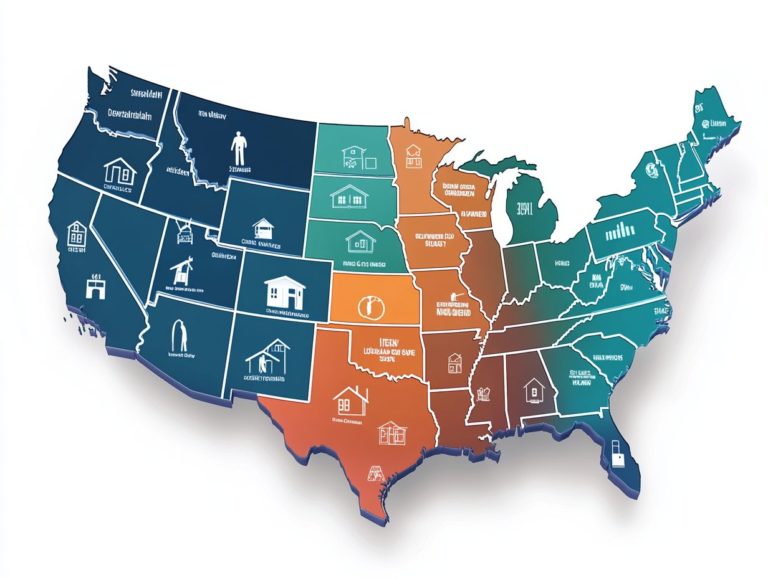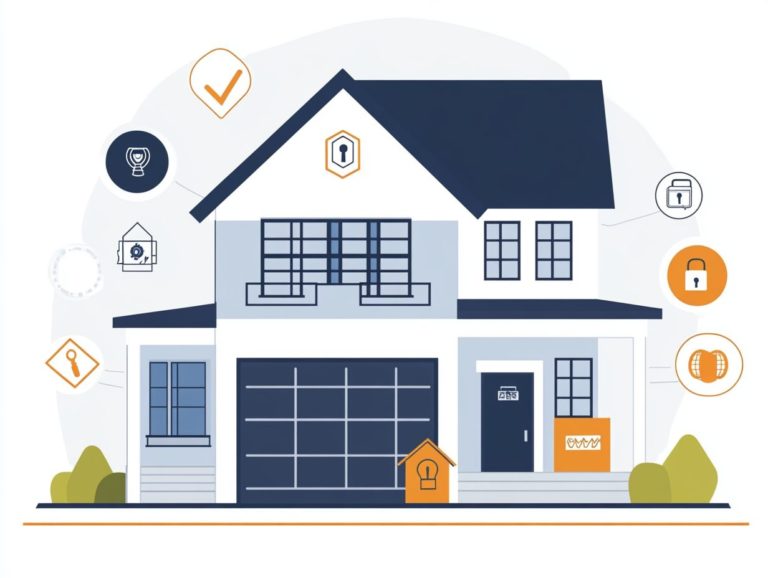The Role of Credit Scores in Home Insurance Rates
Knowing how credit scores affect home insurance can help you save money and manage expenses. Many individuals are unaware that their credit score can significantly impact their insurance premiums.
This article clarifies what a credit score is, how it influences your home insurance rates, and delves into other important factors that come into play. It also offers valuable tips for enhancing your credit score and managing insurance costs effectively, even if your score isn’t flawless.
Discover how you can make informed choices that lead to improved financial outcomes!
Contents
- Key Takeaways:
- Understanding Credit Scores and Home Insurance Rates
- Factors that Impact Home Insurance Rates
- Improving Your Credit Score for Better Rates
- Managing Home Insurance Costs with a Low Credit Score
- The Importance of Regularly Checking Credit Scores
- Frequently Asked Questions
- What is the role of credit scores in home insurance rates?
- How do credit scores affect home insurance rates?
- What is a good credit score for home insurance rates?
- Can I still get home insurance with a bad credit score?
- Why do insurers use credit scores in their rate calculations?
- Can improving my credit score lower my home insurance rates?
Key Takeaways:

- A credit score is a numerical representation of your creditworthiness and can impact the rates you pay for home insurance.
- Factors such as your credit score, along with other considerations, play a role in determining your home insurance rates.
- Taking steps to improve your credit score can lead to better home insurance rates.
- Regularly checking your credit score helps you stay informed and potentially lower your costs.
Understanding Credit Scores and Home Insurance Rates
Understanding credit scores and home insurance rates is essential for homeowners seeking to manage their financial obligations effectively while securing optimal coverage at competitive premiums.
Your credit score, which can come from systems like FICO or VantageScore (two widely used methods for calculating credit scores), significantly influences insurers’ underwriting processes and directly affects the rates you pay for your insurance policies.
By gaining a clear understanding of how these scores shape your financial history, you enable yourself to make informed decisions about your insurance applications and coverage options. This knowledge can lead to meaningful savings on premiums over time, enhancing your overall financial well-being.
What is a Credit Score?
A credit score serves as a numerical snapshot of your creditworthiness, typically calculated using methods like FICO or VantageScore. These systems evaluate various elements, such as your credit history, outstanding debts, and payment reliability.
Your score is primarily shaped by several key factors:
- Payment history: This reflects whether your payments are made on time or if they’ve been late.
- Credit utilization: This indicates how much of your available credit you re actually using.
- Credit inquiries: This shows how often you’re seeking new credit. Credit inquiries happen when lenders check your credit report when you apply for new credit.
Credit bureaus like Equifax, Experian, and TransUnion compile this information into comprehensive credit reports that lenders and insurers meticulously review before making decisions.
A robust credit score can unlock a range of benefits, from favorable loan terms to lower insurance premiums. Conversely, a weaker score may lead to higher rates or challenges in securing financing.
How Do Credit Scores Affect Home Insurance Rates?
Credit scores play a pivotal role in shaping your home insurance rates. Insurers use these scores in their risk assessment processes to evaluate your reliability as a policyholder and the likelihood of you filing claims. Understanding the impact of credit score on premiums can help you make informed decisions about your insurance options.
By incorporating credit-based insurance scores, companies aim to measure your financial responsibility, which they believe correlates with the chances of you needing to make a claim. A high credit score often leads to lower premiums, reflecting the insurer’s view of you as a lower risk.
If your score is on the lower end, you may face higher rates, as insurers perceive you as potentially riskier. This practice underscores the crucial connection between your credit history and how insurers treat you, highlighting the importance of maintaining a solid financial record to secure more affordable coverage.
Factors that Impact Home Insurance Rates

Home insurance rates hinge on a multitude of factors, with credit scores being just one part of the comprehensive risk evaluation performed by insurers.
Beyond credit, elements such as the property’s location, claims history, home security measures, and the specific coverage you choose all play significant roles in determining your overall premiums.
By grasping these components, you can confidently navigate the insurance landscape, making informed decisions that could unlock more affordable options and enhance the protection of your valuable investments!
Don t wait! Improving your credit score today can lead to lower insurance costs tomorrow.
Other Factors Besides Credit Scores
While credit scores certainly matter, other key factors significantly influence your home insurance rates. These include the location of your property, your history of filing insurance claims, and the effectiveness of your home security measures.
Each of these elements impacts how insurers assess risk. A positive claims history showcases responsible homeownership and may lead to lower rates. In contrast, multiple claims can cause your premiums to skyrocket.
Implementing strong home security measures, like alarm systems and surveillance cameras, not only deters potential theft but can also earn you discounts on your premiums.
As a homeowner, you can choose from a range of coverage options from basic property protection to comprehensive policies that include liability and additional living expenses. These choices align with how insurers evaluate risks, providing a personalized approach that caters to your unique needs and financial situation.
Improving Your Credit Score for Better Rates
Enhancing your credit score can lead to more favorable home insurance rates, as insurers place significant emphasis on this score when calculating premiums.
By prioritizing financial responsibility and actively working to improve your credit profile, you can have a substantial impact on your overall insurance costs.
Here are some simple strategies to improve your credit score:
- Reduce outstanding debts
- Make timely payments
- Monitor your credit utilization closely
These actions will not only lead to a healthier credit score but also translate into better rates from insurers.
Tips for Raising Your Credit Score
To effectively elevate your credit score, prioritize consistent payments, manage your credit utilization carefully, and regularly check your financial history for accuracy.
Consider crafting a detailed budget that tracks your income and expenses while earmarking specific amounts for debt repayment.
Responsible credit use means keeping your credit card balances low ideally under 30% of your available limit since high utilization can raise red flags for lenders.
Make it a habit to review your credit reports from reputable sources like AnnualCreditReport.com; this can help you spot discrepancies or errors that might need correction.
Avoid common mistakes, like missing payments or opening too many accounts in a short timeframe, as these can negatively impact your creditworthiness.
Managing Home Insurance Costs with a Low Credit Score

Managing home insurance costs with a low credit score can be challenging, but there are effective strategies to help you!
By understanding the options available to you as a policyholder with a lower credit score, you can take charge and seek solutions that maintain your coverage while keeping costs in check.
Consider exploring alternative insurance providers, assessing various coverage types, and implementing home security measures.
These steps can all lead to more favorable premium rates, regardless of your credit score.
Options for Lowering Home Insurance Rates
You have several strategies for lowering your home insurance rates, including seeking discounts, adjusting your coverage options, and demonstrating financial responsibility to insurers.
Exploring various avenues can help make your insurance more affordable. One effective tactic is to ask about available discounts; many insurers offer reduced rates for features like security systems, smoke detectors, or even a clean claims history.
Bundling your home and auto insurance is another smart move, as many companies provide attractive incentives for combining policies that can lead to significant savings.
Adjusting your coverage levels can also be key. Assess your needs and consider opting for higher deductibles if that suits your financial situation.
By consistently demonstrating financial responsibility such as maintaining a strong credit score you can positively influence your premium rates, paving the way for even more cost reductions.
The Importance of Regularly Checking Credit Scores
Regularly checking your credit scores is essential for maintaining financial health. It ensures your credit reports are accurate.
By monitoring your credit profile, you can spot errors and protect yourself from identity theft. This allows you to make informed financial decisions.
Keeping an eye on your credit not only improves your score but can also save you money. It can lead to lower insurance premiums and enhance your overall financial stability.
How Often Should You Check Your Credit Score?
Make it a habit to check your credit score every three months to stay on top of your financial game! This helps you catch issues early on.
By watching your credit, you can identify errors that may harm your score. This proactive approach makes it easier to secure favorable loan terms or credit cards.
Request free copies of your reports from the major credit bureaus annually. Online services can simplify the process.
Being aware of your credit health can lower your home insurance rates, as insurers often consider credit scores when determining premiums.
Frequently Asked Questions

What is the role of credit scores in home insurance rates?
Credit scores determine the rates you pay for home insurance. Insurers use your score to assess your risk as a policyholder.
How do credit scores affect home insurance rates?
A good credit score can lower your home insurance rates. On the other hand, a poor score may lead to higher rates because insurers see high-scoring individuals as more responsible.
What is a good credit score for home insurance rates?
Each insurer has different criteria, but generally, a score above 700 is considered good. This could result in lower insurance rates.
Can I still get home insurance with a bad credit score?
Yes, you can still obtain home insurance even with a bad score. However, rates may be higher than for those with good scores. Compare quotes from different companies to find the best possible rate.
Why do insurers use credit scores in their rate calculations?
Insurers use credit scores as a risk assessment tool. They believe high scores indicate timely premium payments and a lower likelihood of claims.
Can improving my credit score lower my home insurance rates?
Yes, improving your credit score can lead to lower home insurance rates. As your score rises, you could qualify for better rates. Maintaining a good score is essential for securing the best deals.






